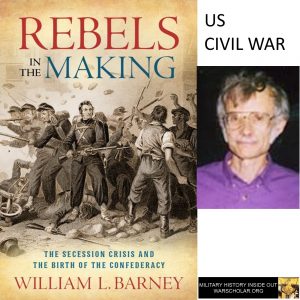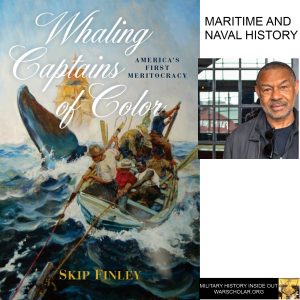 American Civil War – An interview with William Barney about his new book Rebels in the Making, published by Oxford University Press, on Southern secession in 1860 to 1861. Check out the book here https://amzn.to/30aBXVl
American Civil War – An interview with William Barney about his new book Rebels in the Making, published by Oxford University Press, on Southern secession in 1860 to 1861. Check out the book here https://amzn.to/30aBXVl
How did you become interested in studying and writing on the subject of your book?
I first became interested in the American Civil War after reading Bruce Catton during high school. I latched on to secession as a research topic in my years of professional training at Columbia University in the 1960s and always wanted to write a major work on the topic.
What is the book about and what major themes do you focus on?
Rebels in the Making focuses on the years of 1860-1861 when the secession movement climaxed and triggered the Civil War. I found that any persuasive explanation of the politics of secession necessitated placing the drive for secession in the social, economic, and cultural context of the slave South as it matured in the 1850s and constricted opportunities for common whites in acquiring slaves and good land. The need to protect slavery where it existed and leave open the possibility of its future expansion was the main motivating force behind secession. This was the core argument used to attract the support of younger slaveholders aspiring to attain planter status. In presenting my findings, I examined secession, and its success or failure, in all of the fifteen slave states and traced how the vision of the secessionists for the South was embodied in the crafting the constitution and government for the Confederate States of America.
What resource materials or archives did you primarily use for your research?
I cast as wide a net as possible in locating resource material – letters, diaries and journals; slave narratives; court records; contemporary periodicals and newspapers; and legislative proceedings and debates.
What did you discover in your research that most surprised you?
What most surprised me was the extent and depth of the economic depression that gripped the South once credit lines from the North were largely shut down in the financial freeze that accompanied Lincoln’s election. Most economic activity ground to a halt and the ensuing sense of desperation added fuel to the argument of the secessionists that the South had to liberate itself from the financial shackles of the North.
Why did the North shut down the credit lines for the South and what about Lincoln’s election prompted this action? Were there Southern states that were hit particularly harder by this credit crunch than others?
Capital abhors uncertainty and everyone foresaw a major political crisis in the event of Lincoln’s election. Consequently, Northern banks and mercantile houses sought to preserve capital and prevent bankruptcies by tightening or refusing to extend the credit (technically discounting the notes of indebtedness) to Southern factors and planters that was necessary to move cotton to market. The economic crisis was a national one because of uncertainty over whether Southern markets would remain open to Northern merchants and farmers. All states were affected, though the shutdown was probably the deepest in the cash-starved Cotton South.
Was there a particularly difficult issue to research because of lack of information or access to information?
The hardest part of the story to tell was the role played by the slaves, over forty percent of the population in the seven original states that seceded. Slaves, unsurprisingly, left very few first-hand accounts of their feelings or actions and their reaction to the crisis in large measure had to be inferred by what whites wrote of what they thought the slaves were up to. I argue that the slaves were well aware that their day of deliverance was about to come and that they exploited the unrest and excitement in the South in 1860 by setting a rash of fires that further unnerved whites into believing that only a clean break from the North could save them from what they convinced themselves were hordes of abolitionist incendiaries descending on the South and stirring up the slaves.
When you say that Southern slaves started a rash of fires, can you explain that in a little more detail?
Southern newspapers reported an outbreak of fires that began in the spring of 1860 and peaked in the late summer and fall. The fires were attributed to abolitionist emissaries and slaves. The fires destroyed many businesses and some private homes. Most of them, and those almost certainly set by plantation slaves, torched highly combustible cotton gins and the cotton stored therein. The fires were set at night in isolated areas where it was extremely difficult to identify the perpetrators.
Did you have any difficulties in finishing or publishing and how did you overcome those?
Fortunately, the only hurdle in the writing of Rebels was carving out the time for framing and detailing the argument. As in the past, Oxford University Press was an understanding and helpful publisher. The comments and advice of Editor Susan Ferber were all I could have hoped for.
What is your current or next writing project?
I’m currently plunging into a new topic, the nature and extent of Confederate nationalism and the interpretive folly of conflating it with the Confederate state.
Where can people find you online?
I can be found at the website for the Department of History, the University of North Carolina at Chapel Hill. My email is: wbarney@email.unc.edu.
Links of interest
Check out the book here https://amzn.to/30aBXVl
https://global.oup.com/academic/product/rebels-in-the-making-9780190076085
https://history.unc.edu/faculty-members/william-l-barney/
As an Amazon Associate I earn from qualifying purchases.


